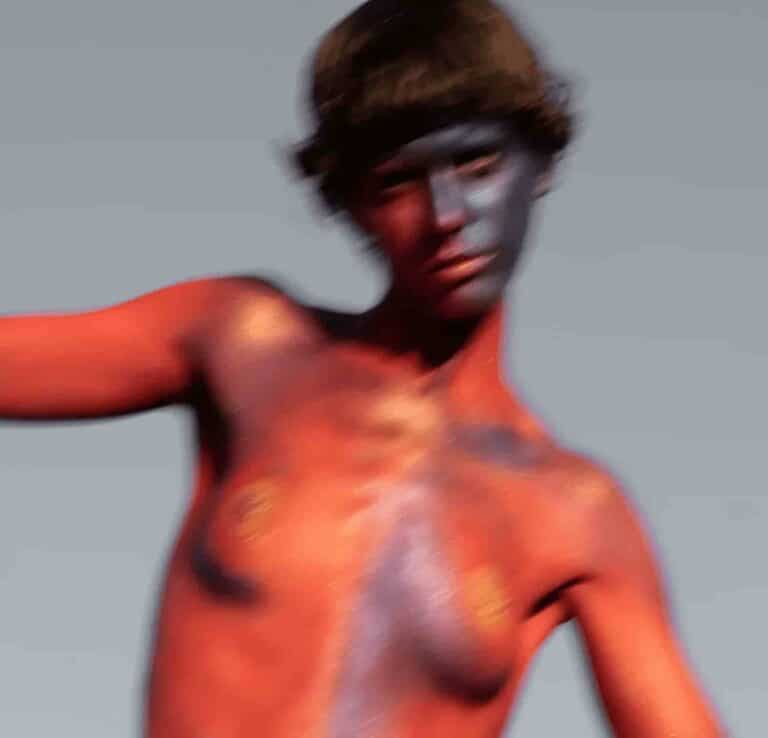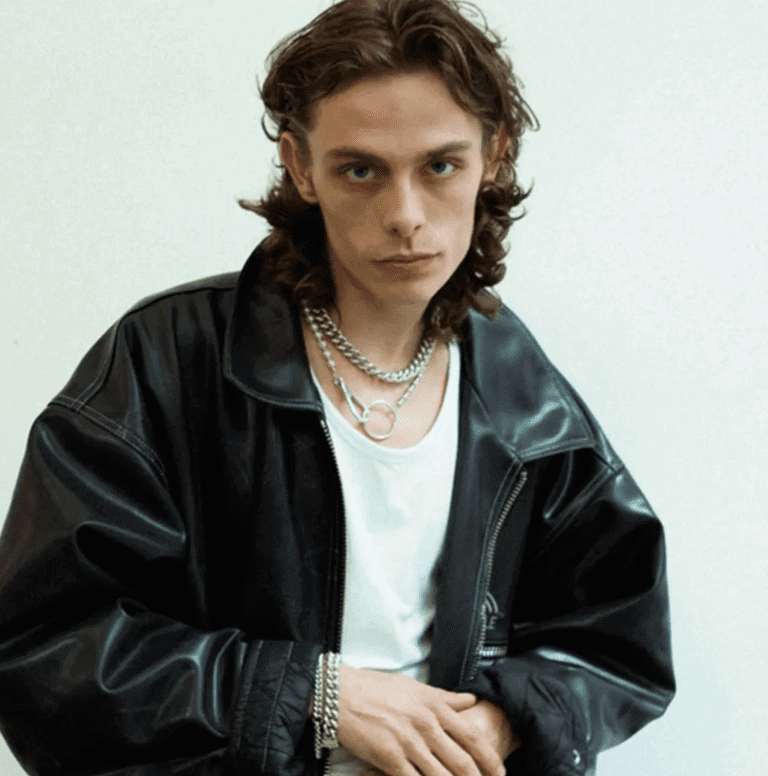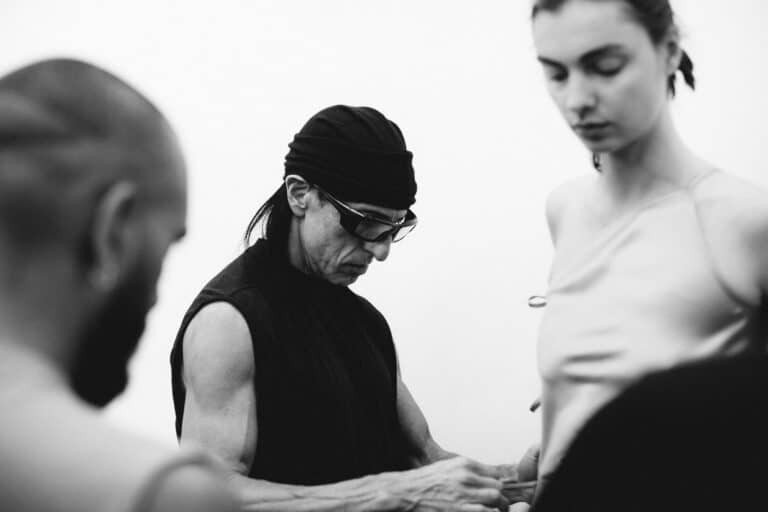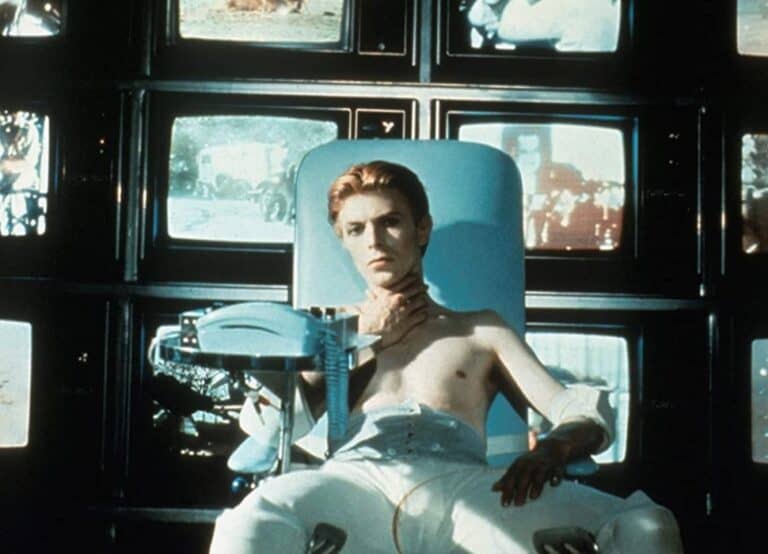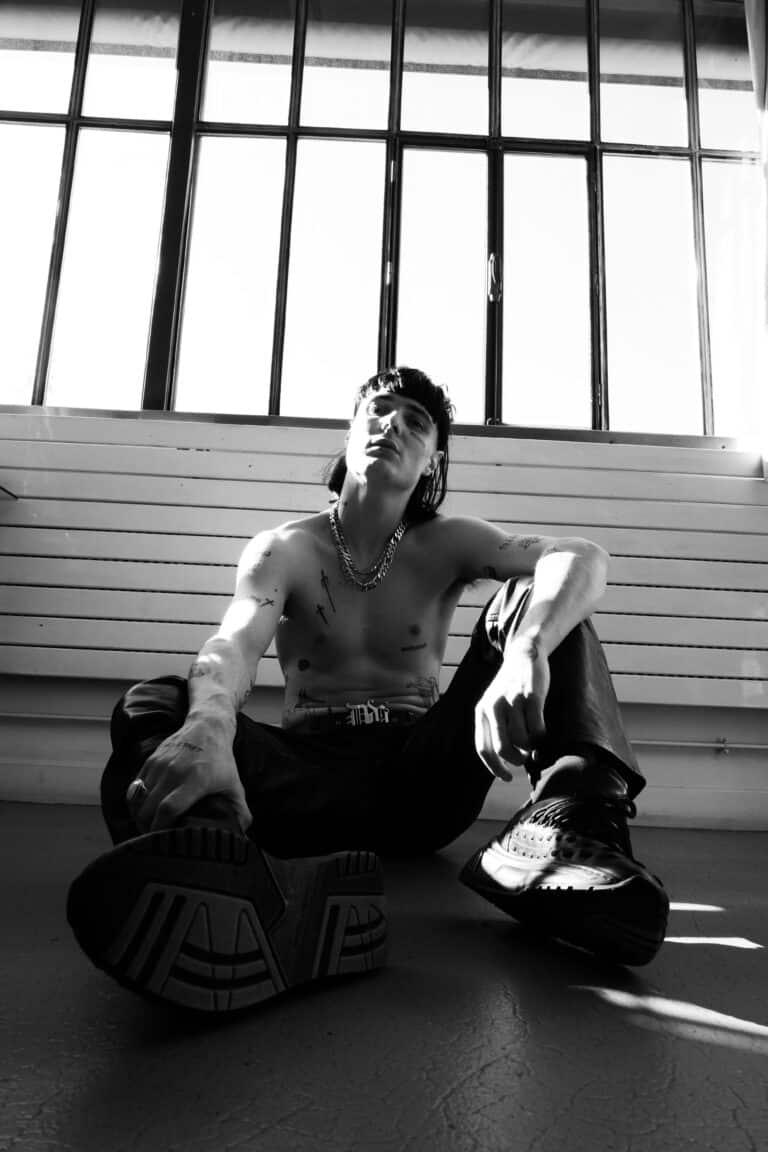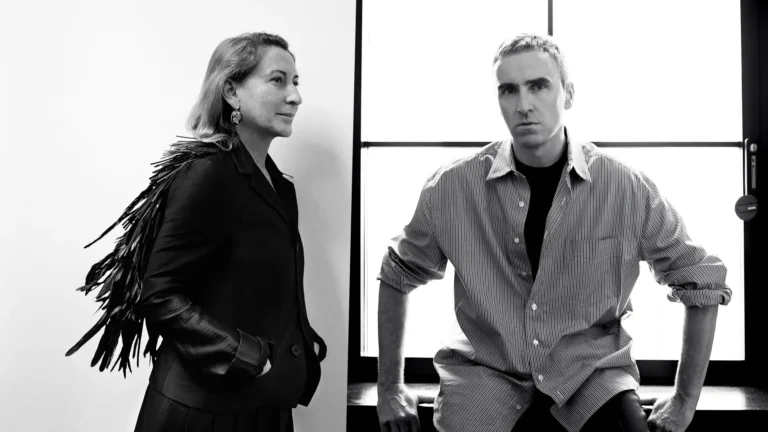Tanner Buchanan Chats with Director Mark Waters About His Early Start and Upcoming Projects
Read time 5 minutes
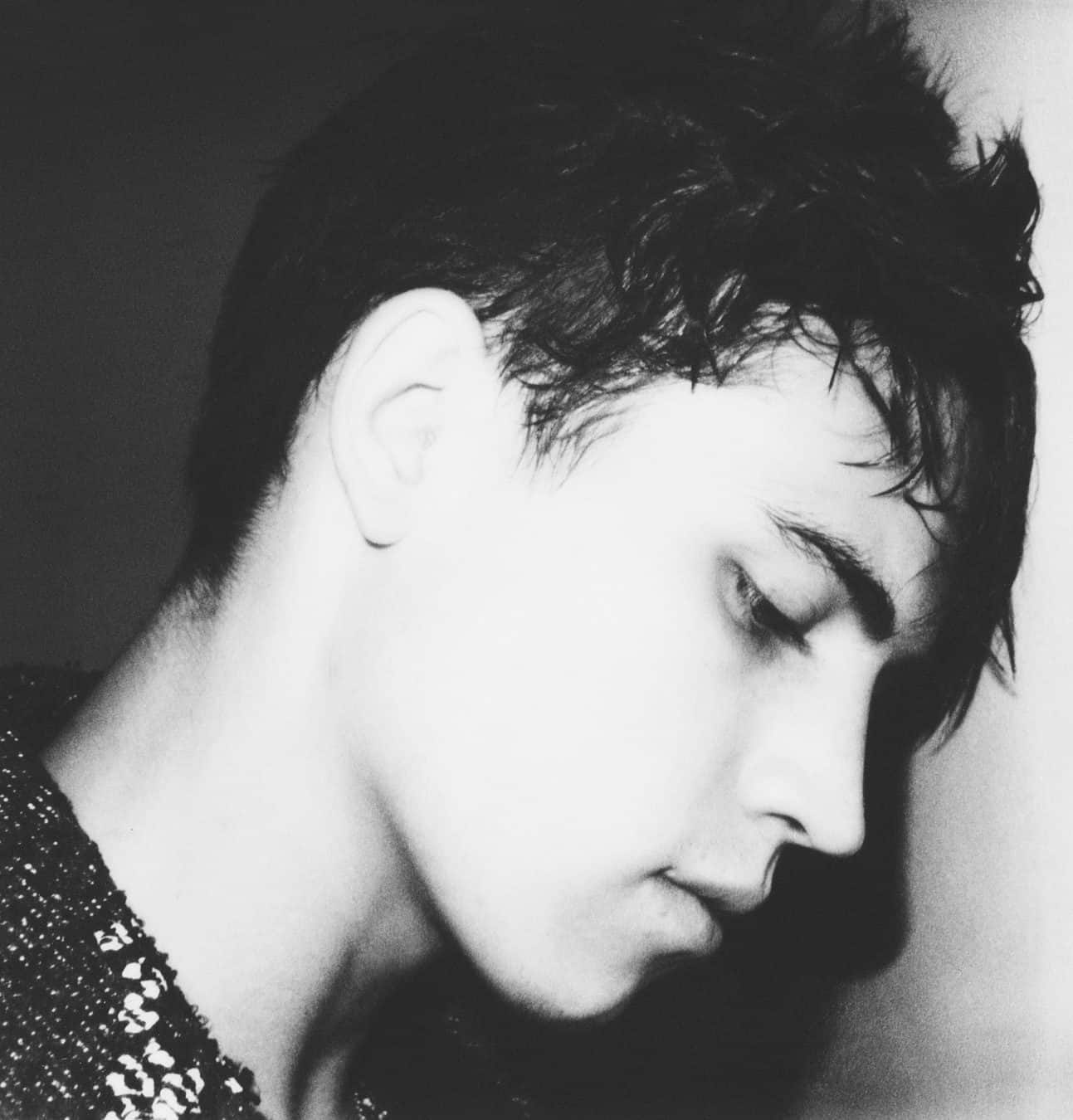
Photographer Drew Jarrett, Stylist Cece Liu.
Coming-of-age films hold a special place in our hearts, often becoming cultural touchstones that resonate with audiences for years to come.
Coming-of-age films hold a special place in our hearts, often becoming cultural touchstones that resonate with audiences for years to come. In 2004, Mean Girls, directed by Mark Waters, set the gold standard for the genre. With its witty script, memorable characters, and keen observations about high school dynamics, it became an instant classic. Fast forward to 2021, and Waters returned to the coming-of-age genre with a fresh take on another classic: She’s All That. This time, he flipped the original script to create He’s All That, a gender-swapped reimagining starring Tanner Buchanan.
Reinterpreting a beloved film is no easy task. For Waters, the key was to maintain the heart of the original while infusing it with a contemporary twist. He’s All That turned the story on its head, focusing on the transformation of a young man rather than a young woman. Buchanan was cast in the role, bringing his own charisma and charm to the character. The challenge was to balance nostalgia with a fresh perspective, something Waters was keenly aware of.
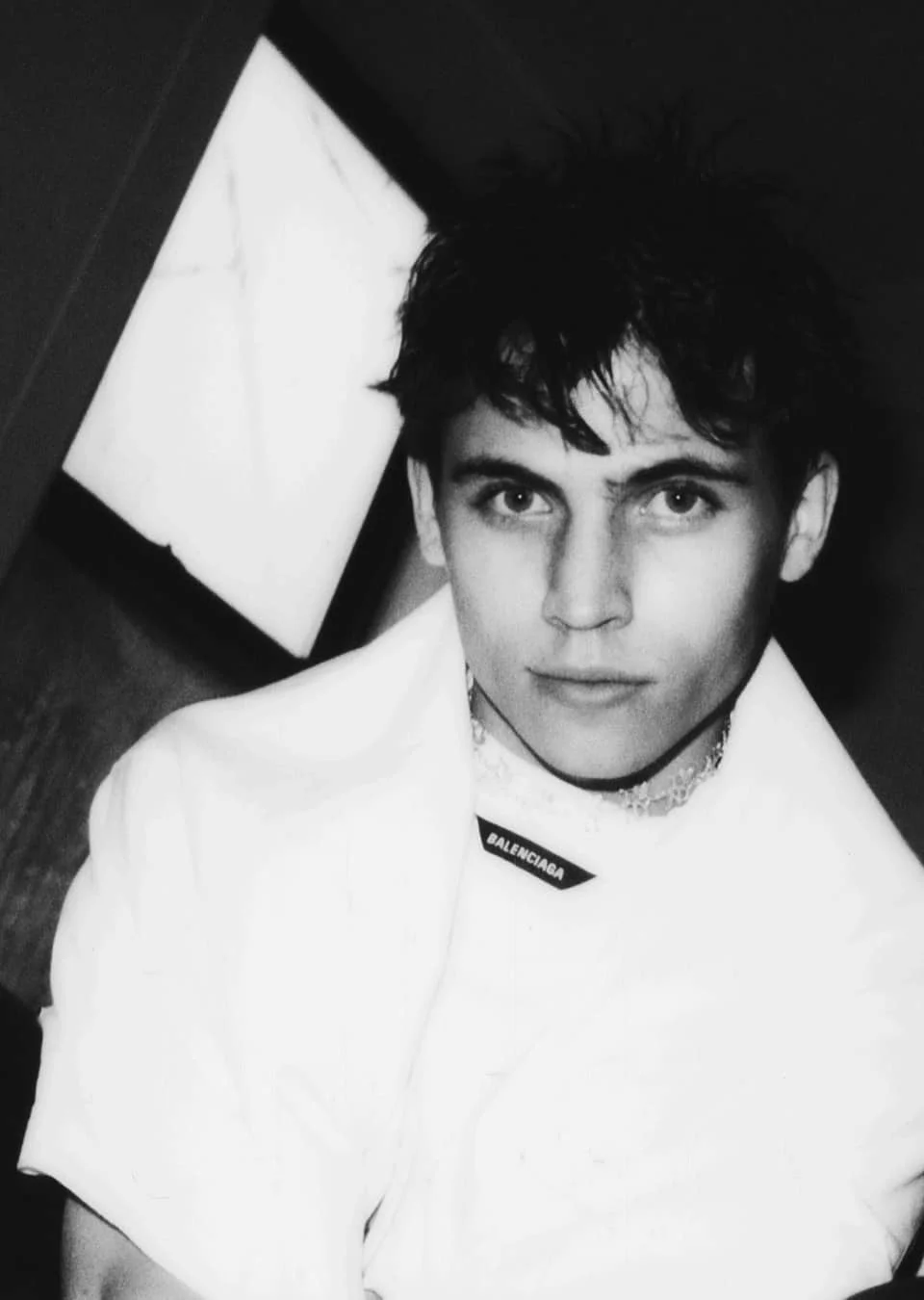
Shirt and trousers both by Prada.
The production of He’s All That took place during a time of significant change in the film industry due to the pandemic. Safety protocols, limited in-person interactions, and virtual meetings became the new norm. For Waters and Buchanan, this meant adjusting to a different way of working. Gone were the casual lunches and dinners where filmmakers could brainstorm and bond. Instead, they had to rely on Zoom calls and strict safety measures on set.
Casting during a pandemic presents unique challenges. Chemistry reads, which are crucial for finding the right on-screen dynamics, became virtual affairs. Buchanan recalls his first meeting with Waters over Zoom, where everything felt rushed. There was little time for casual conversation, and the chemistry read was quick and to the point. This expedited process made it difficult to establish a connection with other actors, something critical for a film that hinges on relationships.
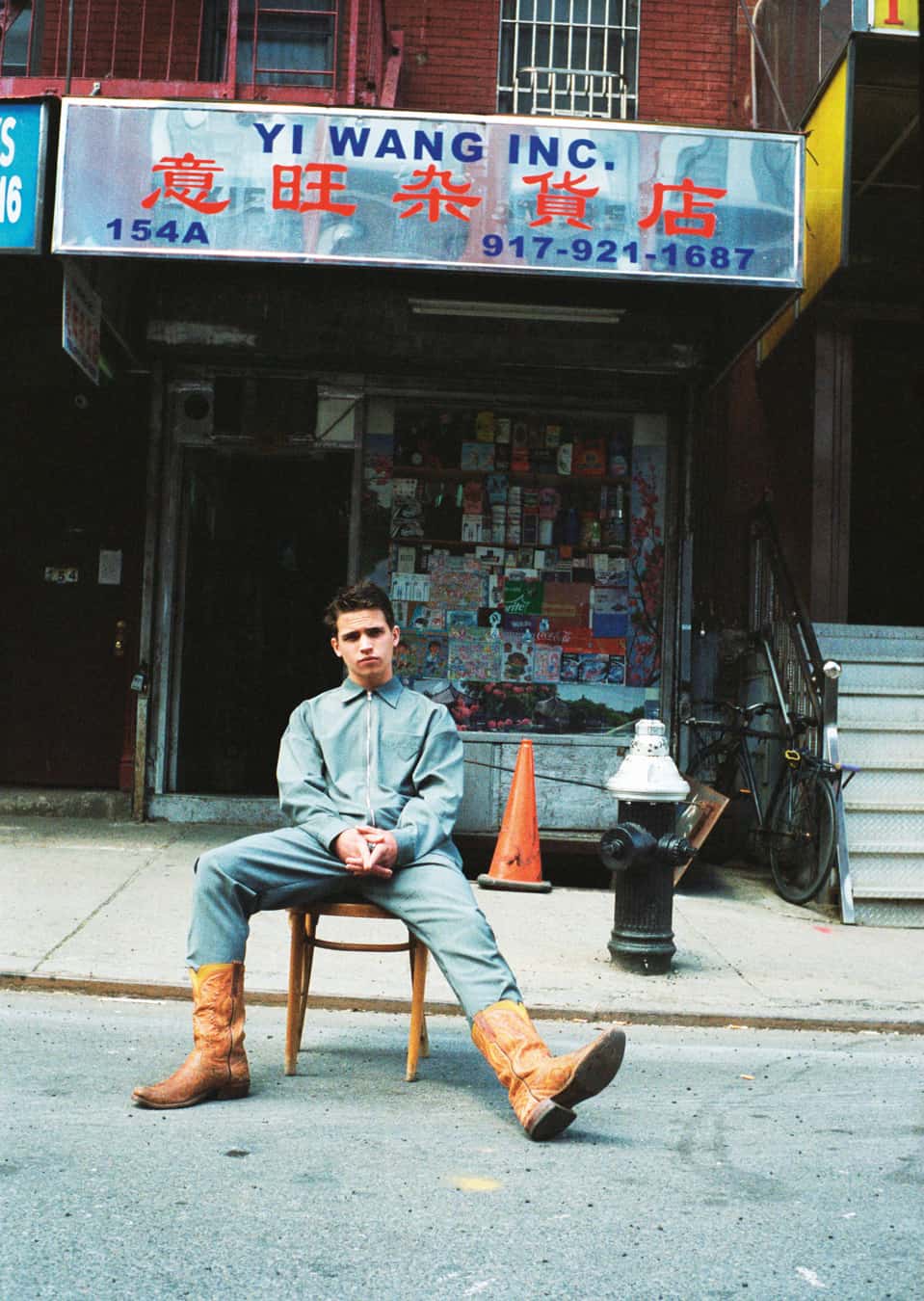
Despite the limitations of virtual casting, Waters emphasizes the importance of chemistry reads. He recounts how, in the past, in-person chemistry reads allowed directors to see how actors interacted with each other. In the case of He’s All That, this process was truncated, adding pressure to get it right quickly. Waters acknowledges the challenge but insists that chemistry is key to a successful film.
Buchanan, despite his relative youth, has already made a name for himself in the industry. His role in Cobra Kai brought him significant attention, but he wants to be known for more than just his looks or charisma. He talks about his desire to take on diverse roles and avoid being typecast. His goal is to be a versatile actor, able to play a range of characters, from artsy outcasts to dramatic leads.
When discussing his career aspirations, Buchanan mentions actors like Sean Penn and Robert Pattinson as inspirations. He admires how they took risks in their careers, choosing challenging roles and working with top directors. Pattinson, in particular, transitioned from a teen heartthrob to a respected actor by choosing unconventional projects. Buchanan hopes to follow a similar path, focusing on honing his craft and taking on roles that push his boundaries.
Waters is known for his collaborative approach to directing. He encourages input from actors and crew, believing that the best idea should win, regardless of where it comes from. Buchanan appreciates this openness, noting how it created a positive atmosphere on set. Waters’ willingness to listen to others and admit when he’s wrong fosters a sense of teamwork, something especially valuable during a time of uncertainty.
One of the unique aspects of filming He’s All That was the compressed schedule. With safety protocols in place, the production team aimed for shorter days to minimize risks. Waters recalls how his first film was shot in 23 days, and they managed to do the same with He’s All That, despite the added complexity of multiple locations and musical sequences. Buchanan found the experience refreshing, as it allowed for more time to rehearse and experiment with his performance.
Buchanan comes from a television background, where the pace is typically faster, and there’s less time for rehearsal. He notes how filming He’s All That felt like a luxury, with more opportunities to experiment and refine his performance. This shift from the rapid pace of TV to the slightly slower rhythm of film production gave him a chance to explore his character in more depth.
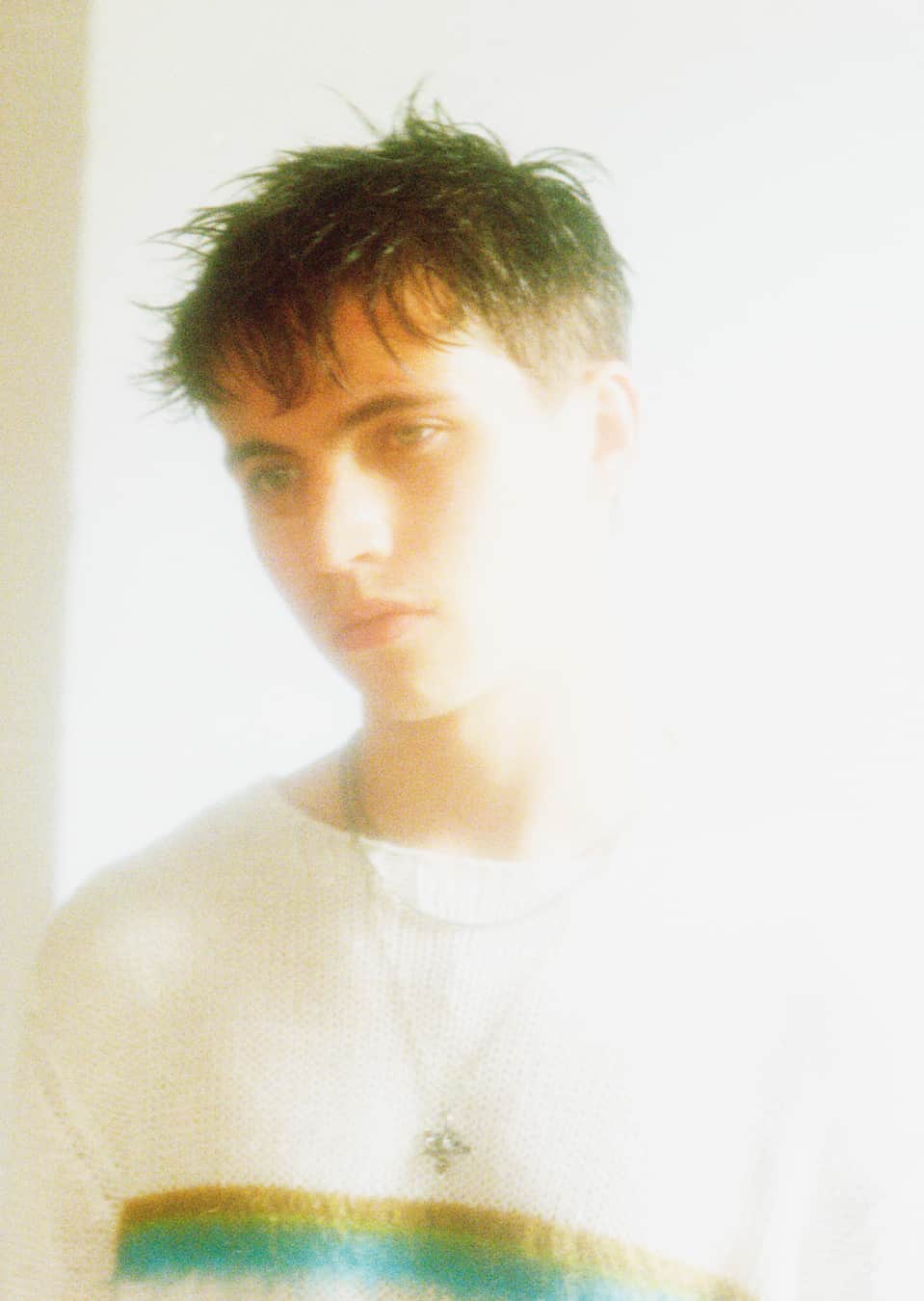
knitwear and jewellery both by SAINT LAURENT by ANTHONY VACCARELLO SS21
Both Waters and Buchanan share a common background—they are originally from the Midwest. This shared connection became a point of conversation during the production. Buchanan talks about his journey from Ohio to Los Angeles at a young age, following his passion for acting. Despite his parents having no background in the industry, they supported his dreams, allowing him to pursue his career in Hollywood.
Buchanan’s journey to Hollywood was not without its challenges. He recalls how he booked his first national commercials within the first six months of arriving in Los Angeles, which was a sign that he was on the right path. However, he also experienced periods of struggle, especially when transitioning from a child actor to a teen and then to an adult. These transitional phases are often difficult, but Buchanan remained determined to succeed.
Having supportive parents was crucial for Buchanan’s early success. Despite not understanding the entertainment industry, they encouraged him to pursue his passion. Buchanan acknowledges that not all aspiring actors have this level of support, which made a significant difference in his journey. Even during the difficult periods when he wasn’t booking roles, he never thought about giving up. His parents’ unwavering belief in him kept him motivated.
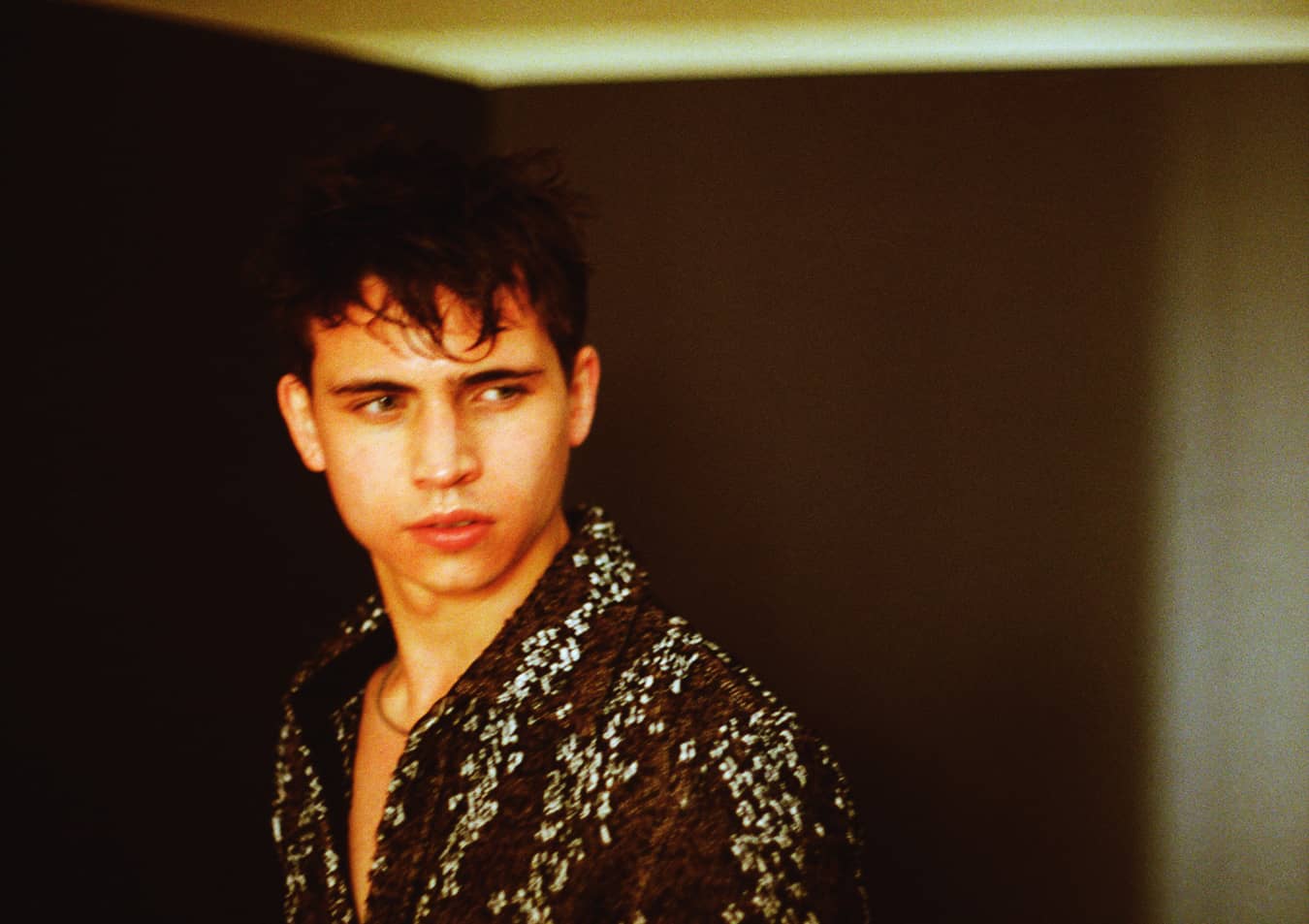
Shirt by Bottega Veneta.
Buchanan is his harshest critic. He talks about how he watches his performances multiple times, always looking for ways to improve. This self-critical approach helps him set new goals and work towards better performances. He believes that self-improvement is key to growth, even if it means being tough on himself. Waters encourages this mindset, emphasizing that it’s better to judge yourself than let others do it for you.
Despite his early success, Buchanan remains focused on his future ambitions. He wants to be known as a versatile actor who can take on a variety of roles. He talks about his desire to work with top directors and explore new genres. While he acknowledges that it’s a challenging industry, he believes that with hard work and dedication, he can achieve his goals. As he continues to build his career, Buchanan hopes to create a lasting impact in the film industry.
Mark: The industry has changed a lot since the pandemic. You’re relatively new to the film business, so you might not realize how different things used to be. In the past, we might have met over lunch to discuss a project or shared several dinners during production. Now, everything’s on Zoom. How has this new way of working impacted you?
Tanner: It’s been weird, to be honest. We first met on Zoom, and there were people in the waiting room, so we couldn’t really talk much. Then, when I came back for the chemistry read, it was super quick—just a short conversation, then the audition. Everything feels much more rushed now.
Mark: I miss those in-person chemistry reads. You can’t replace the feeling of being in the same room with someone and seeing how they interact.
Tanner: Definitely. It’s really tough to connect with someone over video call when you’ve never met them before. You try to have a brief conversation, but you can’t really establish a strong connection. It’s like you just have to hope for the best when you’re reading together.
Mark: Chemistry reads are a crucial part of casting. When you’re trying to find the right mix of people, you really need to see them together in person. But now, with Zoom, it’s a lot harder.
Tanner: Yeah, it’s not easy. I’m just trying to make a name for myself and show I can play a variety of roles, whether it’s the artsy outcast or something more dramatic. I hope I can reach a point where people want me in their projects because of my versatility.
Mark: I see you as someone who could follow the path of actors like Sean Penn or Robert Pattinson. Pattinson went from Twilight to working with top directors like David Cronenberg, taking on grittier roles. Now he’s Batman, but he earned that by taking risks and building credibility.
Tanner: That’s my goal. I want to play different types of characters and grow as an actor. I know it takes time, but that’s the direction I’m aiming for.
Mark: That’s a solid plan. You’re talented and you’re working hard early in your career, which is great. But keep in mind that you need to focus on honing your craft and not just rely on looks or charisma.
Tanner: I know. I’m focusing on learning and getting better. I want to be known for my acting skills, not just my appearance. I want to take on roles that challenge me and push me to grow.
The conversation between Waters and Buchanan covers the impact of the pandemic on film production, the importance of chemistry reads, and the evolving career goals of actors in a changing industry. As Waters reimagines a classic film, Buchanan aims to build a diverse portfolio of roles, showing that there’s much more to him than just good looks.
Mark: The industry has changed a lot since the pandemic. You’re relatively new to the film business, so you might not realize how different things used to be. In the past, we might have met over lunch to discuss a project or shared several dinners during production. Now, everything’s on Zoom. How has this new way of working impacted you?
Tanner: It’s been weird, to be honest. We first met on Zoom, and there were people in the waiting room, so we couldn’t really talk much. Then, when I came back for the chemistry read, it was super quick—just a short conversation, then the audition. Everything feels much more rushed now.
Mark: I miss those in-person chemistry reads. You can’t replace the feeling of being in the same room with someone and seeing how they interact.
Tanner: Definitely. It’s really tough to connect with someone over video call when you’ve never met them before. You try to have a brief conversation, but you can’t really establish a strong connection. It’s like you just have to hope for the best when you’re reading together.
Mark: Chemistry reads are a crucial part of casting. When you’re trying to find the right mix of people, you really need to see them together in person. But now, with Zoom, it’s a lot harder.
Tanner: Yeah, it’s not easy. I’m just trying to make a name for myself and show I can play a variety of roles, whether it’s the artsy outcast or something more dramatic. I hope I can reach a point where people want me in their projects because of my versatility.
Mark: I see you as someone who could follow the path of actors like Sean Penn or Robert Pattinson. Pattinson went from Twilight to working with top directors like David Cronenberg, taking on grittier roles. Now he’s Batman, but he earned that by taking risks and building credibility.
Tanner: That’s my goal. I want to play different types of characters and grow as an actor. I know it takes time, but that’s the direction I’m aiming for.
Mark: That’s a solid plan. You’re talented and you’re working hard early in your career, which is great. But keep in mind that you need to focus on honing your craft and not just rely on looks or charisma.
Tanner: I know. I’m focusing on learning and getting better. I want to be known for my acting skills, not just my appearance. I want to take on roles that challenge me and push me to grow.
The conversation between Waters and Buchanan covers the impact of the pandemic on film production, the importance of chemistry reads, and the evolving career goals of actors in a changing industry. As Waters reimagines a classic film, Buchanan aims to build a diverse portfolio of roles, showing that there’s much more to him than just good looks.
Text by
Adrian Hendrix
Posted
May 13, 2022
Text by
Adrian Hendrix
August 9, 2018
Related
by admin
by Kelly Barnes
by Kylar Ashton
by Adrian Hendrix
Dissenting from reality: Meet Mua Sabu Suzuki and Photographer Mika Kailes
Read time 4 minutes
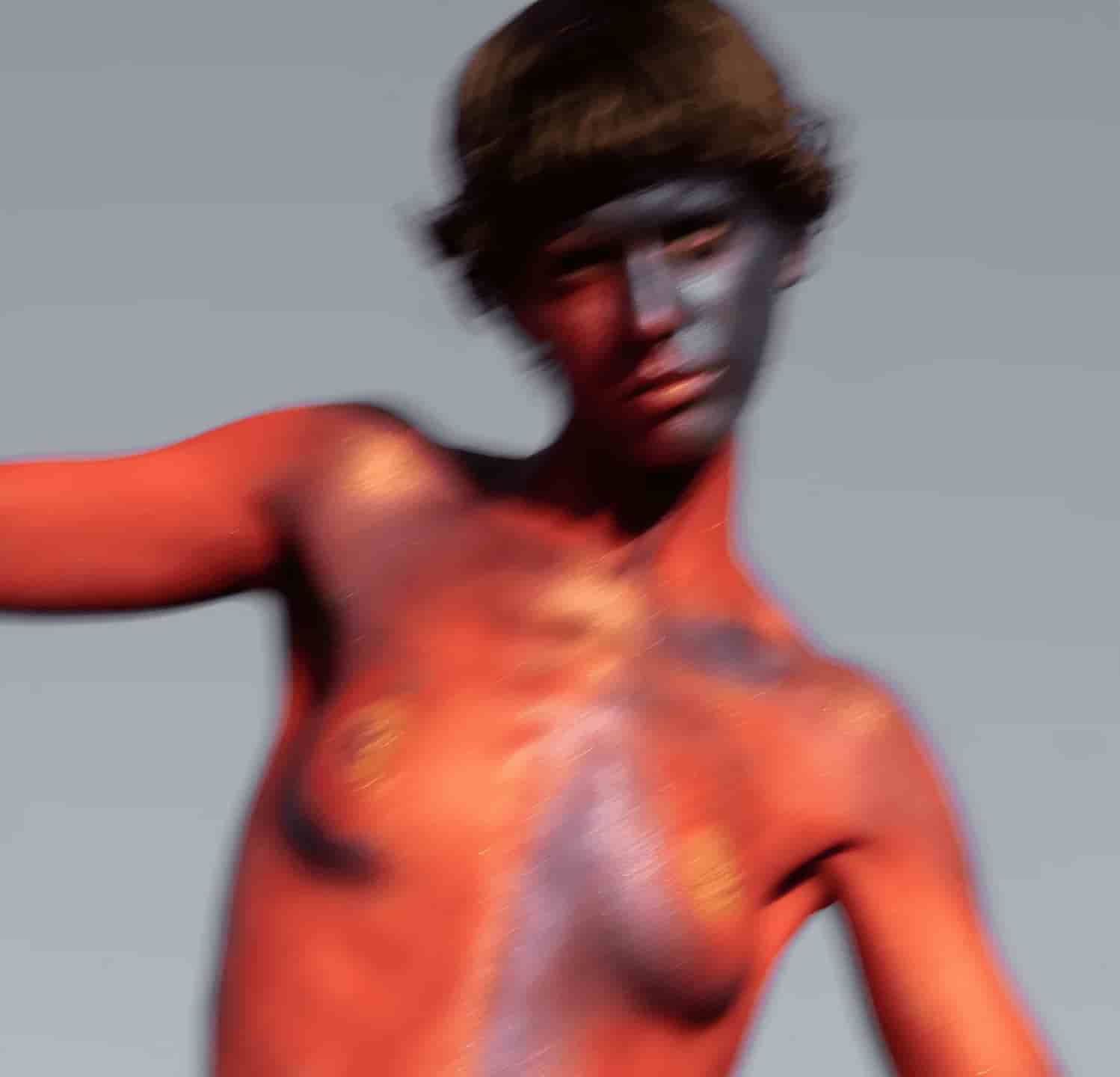
Text by
Kaden Mason
Photography by
Mika Kailes
Posted
March 30, 2024
Photography by Mika Kailes.
Make-up is more than a beauty ritual; it’s a reclamation of identity, a rebellion against the predetermined, and a medium for expression.
In a world that is often preoccupied with conventional beauty standards, make-up has become more than just a tool for enhancing appearance—it has evolved into a form of rebellion, a medium for storytelling, and a catalyst for self-discovery. For 21-year-old make-up artist Sabu Suzuki, the transformative power of make-up transcends its surface-level appeal. Swedish-born and London-based, Suzuki’s artistry is bold, intentional, and disruptive, challenging societal norms and redefining what it means to be beautiful in an era of conformity.
Suzuki’s recent collaboration with photographer Mika Kailes is a testament to his unique approach to the craft. Together, they have created a series of striking images that capture the fluidity of identity and the interplay between light and texture. Each look tells a story that resonates on both a personal and universal level. For Sabu, make-up is not just about painting faces—it’s about bringing inner truths to life and celebrating individuality in its most unapologetic form.
But Sabu’s journey hasn’t been without challenges. From navigating a competitive industry to overcoming personal struggles, he has faced moments of doubt and uncertainty. Yet, through it all, he has remained steadfast in his belief that make-up is a powerful medium of expression. “Make-up,” he says, “is not about hiding who you are—it’s about revealing who you want to be.”
As we sit down for this conversation, Sabu reflects on his beginnings, inspirations, and the philosophies that drive his work. With a laugh as vibrant as his creations, he welcomes us into his world—a space where art meets identity, and where every brushstroke is an act of self-empowerment.

Photography by Mika Kailes.
Kaden: Can you recall the first time you did someone’s make-up? What was the experience like?
Sabu Suzuki: Oh, absolutely! It’s seared into my memory—partly because it was such a disaster but also because it was a pivotal moment for me. I remember using this drugstore foundation that was completely the wrong shade and piling it on like I was frosting a cake. The end result wasn’t pretty, but there was something magical about the process. It was the first time I felt the thrill of transforming someone’s appearance, even if I didn’t quite know what I was doing. I think those early attempts are crucial—they teach you to embrace imperfection and to keep experimenting until you find your voice. Looking back, I realize that the heart of what I do now was already there in those clumsy moments: the desire to tell a story and create something meaningful.
Kaden: Why do you believe make-up is important in today’s world? It feels like people have very polarized opinions about it.
Sabu Suzuki: That’s such a loaded question, but I love it because it gets to the heart of why I do what I do. Make-up is important because it’s one of the few art forms that’s accessible to almost everyone. You don’t need a gallery or a platform to make an impact—you just need a face and some imagination. At the same time, it’s also a deeply personal thing. For some, it’s a way to express joy or creativity; for others, it’s a shield or a source of confidence. What’s fascinating to me is how polarizing it can be. Some people see it as empowering, while others see it as superficial. I think both perspectives miss the point. Make-up isn’t about vanity or conformity—it’s about choice. It’s about taking control of how you present yourself to the world, and in that sense, it’s incredibly powerful.

Photography by Mika Kailes.
Kaden: When did you know that make-up was going to be more than just a hobby for you?
Sabu Suzuki: That realization hit me like a ton of bricks during one of the hardest periods of my life. I was going through a lot emotionally and felt completely disconnected from myself. One day, almost on a whim, I started playing with make-up. It wasn’t for a job or a look—I was just painting my face to see if I could create something that felt alive. That process became my therapy. It helped me reconnect with parts of myself that I thought were lost. Over time, I started to see make-up not just as a coping mechanism but as a calling. It became clear to me that this was what I was meant to do—not just for myself but for others, too.
Kaden: How do you view make-up as an art form? A lot of people still see it as something trivial or surface-level.
Sabu Suzuki: I completely disagree with that mindset. Make-up is one of the most dynamic art forms because it’s alive. Think about it: you’re working on a canvas that breathes, emotes, and changes with every passing moment. That’s what makes it so exciting—and also so challenging. You’re not just creating something to look at; you’re creating something that interacts with the world. For me, make-up is about transformation, not just in a physical sense but on an emotional and spiritual level, too. It’s about taking what’s inside and bringing it to the surface in a way that feels authentic and powerful.

Photography by Mika Kailes.
Kaden: Your work feels deeply personal. How do you navigate creating something that resonates with your own story but also connects with others?
Sabu Suzuki: That’s a balance I’m always trying to strike. My work is undeniably rooted in my personal experiences—my struggles, my identity, and even my joys. But what I’ve learned is that the more specific you get, the more universal it becomes. People see their own stories in your honesty. When I create a look, I’m not just thinking about what it means to me; I’m thinking about how someone else might interpret it. It’s like planting a seed and letting others grow their own meaning from it. That’s the beauty of art—it becomes a shared experience.
Kaden: Have you ever felt pressure to conform to certain beauty trends or standards, especially in the industry?
Sabu Suzuki: Oh, absolutely. The beauty industry is full of unspoken rules and trends that you’re “supposed” to follow. But honestly, I’ve never been interested in playing by those rules. Early in my career, I felt that pressure to create looks that were “trendy” or “marketable,” but it didn’t feel authentic to me. I realized I’d rather be known for doing something unique—even if it’s polarizing—than for creating work that looks like everyone else’s. The way I see it, trends come and go, but authenticity lasts forever.
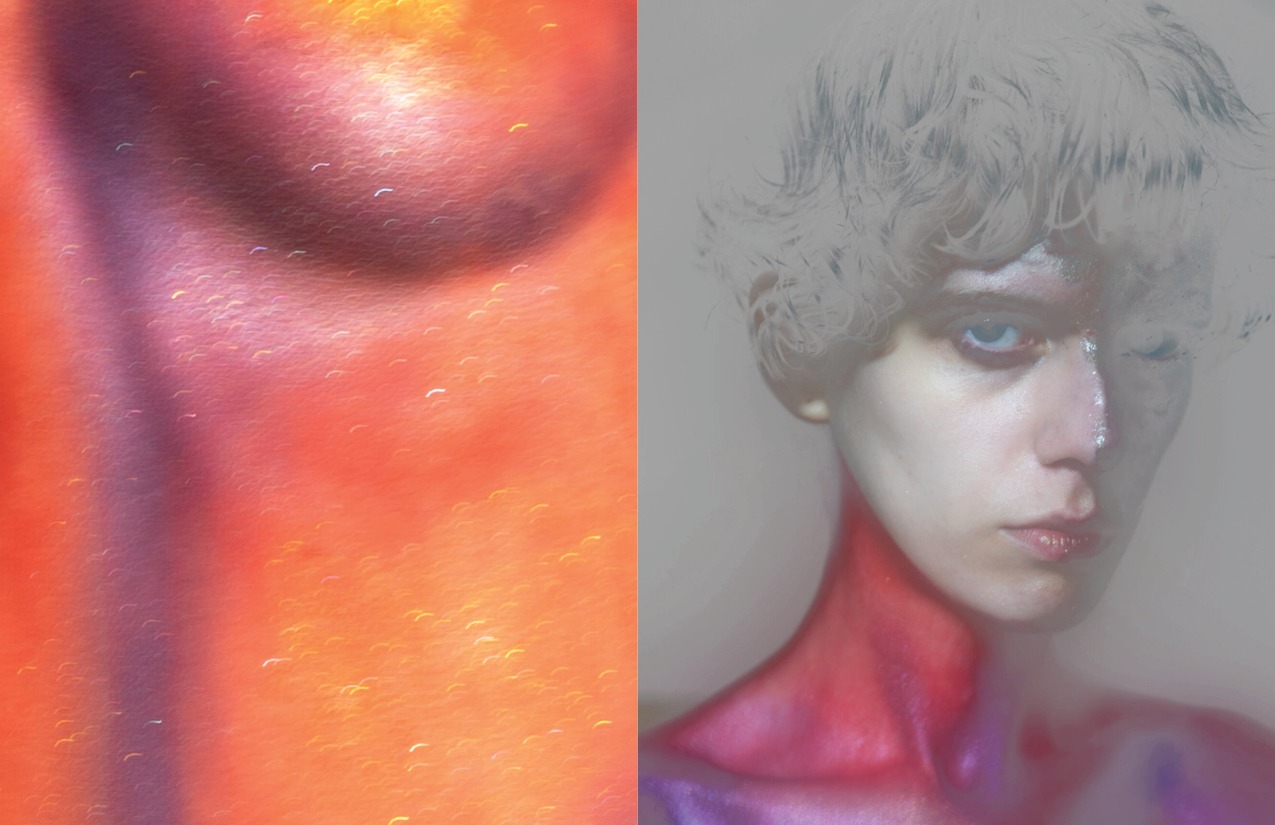
Photography by Mika Kailes.
Kaden: What inspires you when you’re working on a new look or concept? Do you draw from specific sources?
Sabu Suzuki: Inspiration is everywhere if you’re open to it. I get ideas from the most random things—like the way light hits a cracked mirror or the texture of peeling paint on a wall. Music plays a huge role, too. Sometimes a single song can inspire an entire look. And of course, people inspire me—how they move, how they express themselves, how they carry their stories in their faces. I think the most exciting part of being an artist is that you never run out of things to be inspired by. The world is a giant mood board if you pay attention.
Kaden: What advice would you give to someone who’s just starting out as a make-up artist but feels overwhelmed by the competition?
Sabu Suzuki: First of all, it’s okay to feel overwhelmed—that’s normal. But don’t let it paralyze you. The best advice I can give is to focus on finding your own voice. It’s tempting to look at what others are doing and try to emulate that, but the only way to stand out is to be true to yourself. Experiment, make mistakes, and don’t be afraid to create something that feels “wrong” by industry standards. Some of the most groundbreaking work comes from people who dared to do things differently. And remember, your journey is yours alone—don’t compare your chapter one to someone else’s chapter ten.
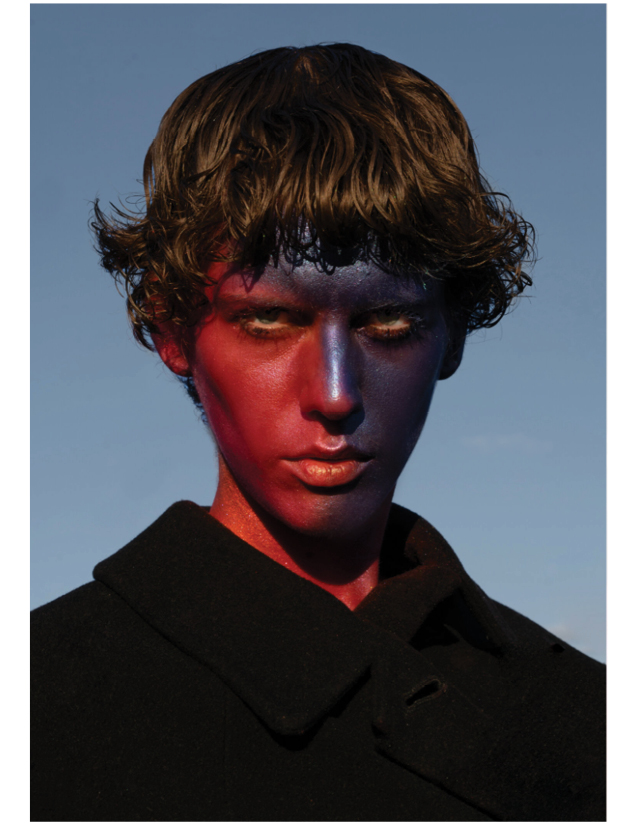
Photography by Mika Kailes.
As our conversation winds down, it’s clear that Sabu Suzuki is not just a make-up artist—he’s a visionary. His work challenges conventional ideas about beauty, art, and identity, inviting us to see make-up as a tool for empowerment and self-expression. Through his bold creations, he encourages us to embrace imperfection and celebrate individuality.
Sabu’s journey is a reminder that art can emerge from the most unexpected places. Whether it’s inspired by a moment of personal struggle or the mundane patterns of everyday life, his work proves that beauty is everywhere if you’re willing to look for it. His collaboration with Mika Kailes is a shining example of how make-up can transcend its traditional boundaries, becoming a medium for storytelling and connection.
But perhaps the most profound takeaway from Sabu’s story is his unwavering belief in the power of choice. “Make-up,” he says, “is not about conforming to someone else’s standards. It’s about creating your own rules and living by them. It’s about taking control of your narrative and saying, ‘This is who I am.’”
Text by
Kaden Mason
Posted
March 30, 2024
Text by
Kaden Mason
Photography by
Mika Kailes
March 25, 2025
Related
by Kelly Barnes
by DREEDN
by Andrekka Lanier


